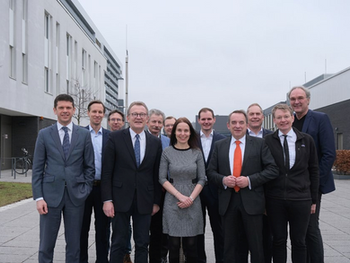top of page


PROXIDRUGS at “Die Farben der Biotechnologie” closing event
On February 11th, Kerstin Koch, project lead of the PROXIDRUGS project InnoDATA, joined a panel discussion at the closing event of the series “Die Farben der Biotechnologie” hosted by Technologieland Hessen. The event brought together experts from across the biotech landscape to discuss how innovation ecosystems and clusters can act as accelerators for scientific and technological progress. As part of the panel, PROXIDRUGS contributed the cluster perspective to the dialogue,
Feb 20


ProxiCapture: New platform to explore molecular glue-induced protein interactions
Scientists from Ivan Đikić lab at Goethe University Frankfurt and Radosław Nowak lab at the University of Bonn, within PROXIDRUGs network, invented ProxiCapture – an innovative affinity-proteomics platform that enables the systematic analysis of degrader-induced protein interactions directly in native cell and tissue samples. Molecular glue degraders are an emerging class of small molecules that can redirect cellular protein disposal systems to eliminate disease-relevant prot
Feb 17


Pharmaceutical exchange meeting of the House of Pharma & Healthcare with PROXIDRUGS participation
On February 6, 2026, representatives from academia, clinic, industry, and politics met to an exchange meeting of the House of Pharma & Healthcare. The focus of the meeting was a structured overview of the activities of the House of Pharma & Healthcare as a platform for interdisciplinary exchange and knowledge transfer between universities, industry, and the public sector. The importance of Frankfurt as a hub for pharmaceutical research, education, and translation was particul
Feb 13


Targeting the spliceosomal protein USP39 through allosteric ligands and PROTAC-induced degradation
In a new publication in Angewandte Chemie PROXIDRUGS member Xinlai Cheng and researchers from Goethe University Frankfurt, Max Planck Institute of Biophysics and Ludwig Maximilian University Munich have reported an important advance in targeted protein degradation by developing a potent degraders (PROTACs) against the spliceosomal protein USP39. RNA splicing is essential for gene expression, and its dysregulation is strongly linked to cancer and neurodegenerative disorders.
Jan 30


Comprehensive map of human E3 ligases reveals new opportunities for targeted protein degradation
In a new publication in Nature Communications, a team of PROXIDRUGS researchers at Goethe University Frankfurt, working within the InnoDATA project, reports the first comprehensive, data-driven classification of all human E3 ubiquitin ligases. The study presents a systematic map of the human “E3 ligome” and provides new insights into the functional relationships among E3 ligases. Using AI-supported computational analyses combined with experimental validation, the researcher
Dec 30, 2025


PROXIDRUGS annual meeting 2025 in Kassel
On December 2 and 3, the PROXIDRUGS annual meeting 2025 brought the cluster community together for the fifth time for two days of inspiring scientific exchange and productive discussions. Partners from across the PROXIDRUGS consortium met in person alongside members of the advisory board and representatives from Projektträger Jülich, creating a dynamic and collaborative atmosphere. Bringing the entire cluster community together once again highlighted the exceptional value of
Dec 8, 2025


Conformational domino: How coupled structural changes control macrocycle behavior
A new study published in the Journal of Medicinal Chemistry sheds light on how conformational changes in macrocycles are tightly coupled and propagated in a domino-like cascade, ultimately governing their overall behavior. This multi-institutional effort brought together PROXIDRUGS members from TU Darmstadt, Fraunhofer ITMP, and AbbVie, alongside collaborators from ETH Zurich and the Max Planck Institute in Munich, combining complementary experimental and computational expert
Dec 1, 2025


PROXIDRUGS project leaders Ivan Đikić and Gerhard Hummer recognized as highly cited researchers
This year, two PROXIDRUGS project leaders, Ivan Đikić and Gerhard Hummer, have been named as Highly Cited Researchers, recognizing their outstanding influence in the life sciences. Ivan Đikić has been awarded for the eighth consecutive year, his research papers have ranked among the most cited from 2014 to 2024 in the two categories “Biology and Biochemistry” and “Molecular Biology and Genetics”, as recorded by Web of Science. Gerhard Hummer has been honored for the third yea
Nov 14, 2025


Friedrich Merz visiting professorship 2025: Prof. Raymond Deshaies visits Goethe University Frankfurt
From 3–7 November, a series of events took place as part of the Friedrich Merz Visiting Professorship, which in 2025 was awarded to Prof. Raymond Deshaies. Enabled by the Merz Foundation and organized by the curatorial team and PROXIDRUGS project leads Maike Windbergs and Stefan Knapp, the programme offered numerous opportunities for scientific exchange and inspiration. Across several dedicated formats, students, researchers, and members of the public were invited to engage
Nov 13, 2025


New project funding: ProxiUS launches outreach program to North America
As part of the “BMFTR Initiates – Research with North America” program, the ProxiUS project was approved to start on November 1, 2025. The project is part of the Cluster4Future PROXIDRUGS and based at Goethe University Frankfurt. Over the next two years, it will enable the cluster to establish scientific exchange and outreach programs with North America and to strengthen transatlantic collaboration in a sustainable way. The goal is to build collaborations with researchers at
Nov 3, 2025
bottom of page
